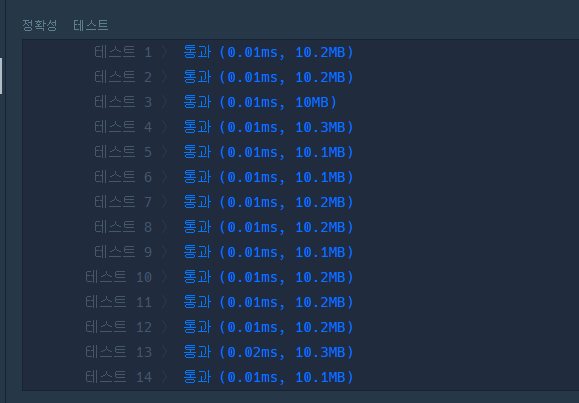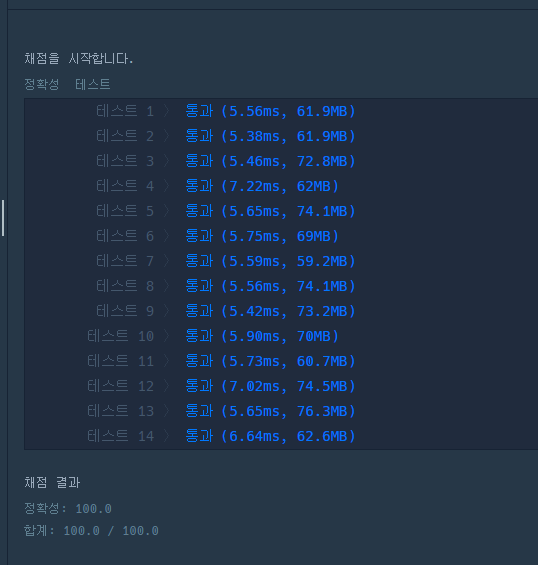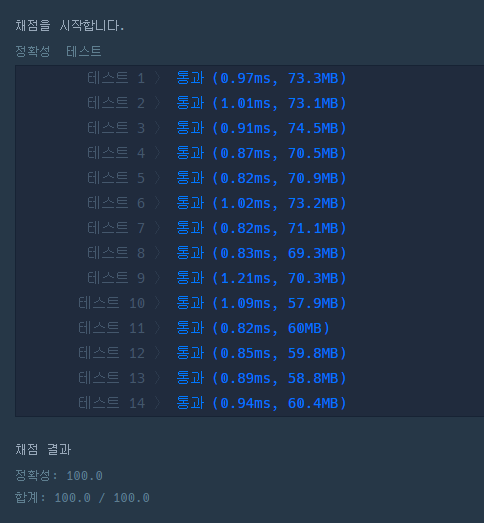Notice
Recent Posts
Recent Comments
Link
| 일 | 월 | 화 | 수 | 목 | 금 | 토 |
|---|---|---|---|---|---|---|
| 1 | 2 | 3 | 4 | 5 | 6 | 7 |
| 8 | 9 | 10 | 11 | 12 | 13 | 14 |
| 15 | 16 | 17 | 18 | 19 | 20 | 21 |
| 22 | 23 | 24 | 25 | 26 | 27 | 28 |
Tags
- redux
- 테코테코
- 항해99
- 항해플러스
- C++
- 프로그래머스
- 자바
- sw expert academy
- axios
- Get
- Algorithm
- redux-saga
- 이코테
- 코딩테스트합격자되기
- 알고리즘
- useDispatch
- 매일메일
- maeil-mail
- SW
- json-server
- 리액트
- react-redux
- react-router
- java
- JavaScript
- redux-toolkit
- programmers
- Python
- createSlice
- react
Archives
- Today
- Total
Binary Journey
[프로그래머스] 서울에서 김서방 찾기 본문
반응형
출처: 프로그래머스 코딩 테스트 연습, https://programmers.co.kr/learn/challenges

** Javascript
function solution(seoul) {
return `김서방은 ${seoul.indexOf("Kim")}에 있다`;
}
노마드코더가 알려준 sexy javascript backticks 사용!
** Python
파이썬은 세 가지 방법이 있다. 방법마다 특징이 있다.
1)
def solution(seoul):
return "김서방은 " + str(seoul.index("Kim")) + "에 있다"
- 속도가 가장 빠름
- 메모리 가장 적게 차지함

2)
def solution(seoul):
return ('김서방은 %d에 있다' %seoul.index('Kim'))
- 속도가 가장 느림
- 메모리 두번째로 적게 잡아 먹음

3)
def solution(seoul):
return "김서방은 {}에 있다".format(seoul.index('Kim'))
- 속도는 두 번째
- 메모리 가장 많이 잡아 먹음

** Java
Java도 세 가지 방법이 있고 각 방법마다 특징이 있다.
1)
import java.util.*;
class Solution {
public String solution(String[] seoul) {
return "김서방은 " + Arrays.asList(seoul).indexOf("Kim") + "에 있다";
}
}
- 시간 오래 걸림
- 메모리도 전반적으로 많이 차지함

2)
class Solution {
public String solution(String[] seoul) {
for (int i = 0; i < seoul.length; i++) {
if (seoul[i].equals("Kim")) {
return "김서방은 " + i + "에 있다";
}
}
return "";
}
}
- 속도 제일 느림
- 메모리는 1보다는 나으나 그래도 많이 차지함

3)
import java.util.*;
class Solution {
public String solution(String[] seoul) {
return String.format("김서방은 %d에 있다", Arrays.asList(seoul).indexOf("Kim"));
}
}
- 셋 중 가장 빠름
- 메모리도 전반적으로 셋 중 덜 차지함

4) (번외) 2와 3을 활용
class Solution {
public String solution(String[] seoul) {
for (int i = 0; i < seoul.length; i++) {
if (seoul[i].equals("Kim")) {
return String.format("김서방은 %d에 있다", i);
}
}
return "";
}
}
- 속도 준수하나 3번보다는 느림
- 메모리는 3번과 비슷

반응형
'프로그래머스 > level 1' 카테고리의 다른 글
| [프로그래머스] 실패율 (0) | 2021.08.23 |
|---|---|
| [프로그래머스] 소수 찾기 (0) | 2021.08.23 |
| [프로그래머스] 수박수박수박수박수박수? (0) | 2021.08.23 |
| [프로그래머스] 문자열을 정수로 바꾸기 (0) | 2021.08.23 |
| [프로그래머스] 약수의 합 (0) | 2021.08.14 |




